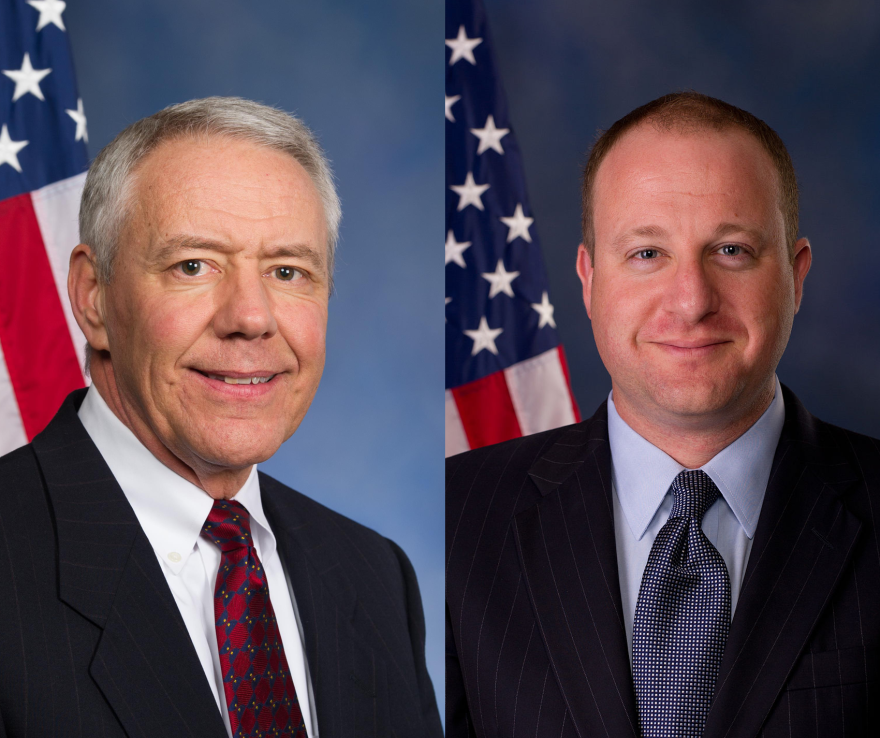“Follow the money.”
That’s a line from All The President’s Men, the film about the 1970s Watergate scandal -- and the investigative reporting that brought down the Nixon presidency. In the aftermath, Congress created the Federal Election Commission to enforce laws governing the funding of elections. The commission has always been made up of six members – three Republicans, three Democrats.
Now, a handful of lawmakers want to change that. They say the bipartisan makeup of the commission has created a stalemate that’s preventing campaign finance laws from being enforced, particularly in recent years, and want to create an independent, deciding vote on the commission.
Twelve members of Congress are supporting the Restoring Integrity to America’s Election Act, including two from Colorado: Reps. Ken Buck and Jared Polis, a Republican and a Democrat, respectively.
Buck said the commission was “set up in a way that invited deadlock, and that’s just what we’ve got.”
“We want to make sure that we are enforcing the law and going after those candidates who are breaking the law, but we also need to make sure that we are exonerating those quickly who have done nothing wrong or whose mistake was a trivial one,” said Buck, who represents the 4th Congressional District in Eastern Colorado.
Ann Ravel, a Democrat, resigned from the FEC earlier this year. She was highly critical of the commission in an interview with NPR, saying that a partisan deadlock has crippled the commission’s investigatory and enforcement mission.
But Commissioner Lee Goodman, a Republican, has defended the FEC’s work. He recently told The Hill that the commission has reached impasses on a relatively small number of matters.
Polis, who represents the 2nd Congressional District in Northern Colorado, said the FEC’s deadlock has complicated his own campaign – and others. He said he asked the commission if he could receive electronic Bitcoins as campaign contributions, but got no guidance.
“So typical of the FEC in every regard, they wouldn’t tell us yes or no -- they just didn’t give us an answer,” Polis said.
Polis added, “On everything of consequence to candidates, they are effectively a non-entity that doesn’t even render opinions.”
The act seeks to reduce the number of commissioners from six to five. No more than two members of the commission could be from the same party. A fifth proposed commissioner would be the chairperson and nominated by the president and confirmed by the Senate for a 10-year term.
Groups like Issue One, a bipartisan advocacy organization focused on government ethics and political reform, are supporting the legislation as a way to restore enforcement surrounding money in politics.
Other groups, like the Center for Competitive Politics, worry that the bill’s deciding presidential pick would create an ideological tilt on the commission.
“It would transform campaign finance law enforcement into a partisan exercise, no matter how the agency markets itself,” the group said in a press release.
Interview highlights
On the "pay-to-play" system in politics:
Buck: There are two types of donations that I see in Washington, D.C.; that I see in politics. One is ideological giving and I have no objection to folks who want to support a candidate because they believe in the 2nd Amendment or don’t believe in the 2nd Amendment or believe in gun rights or don’t believe in [it] or are in favor of gun control, whatever the issue is.
But when you tie that – and we get into transactional giving – when you tie it to a particular bill, or a particular piece of legislation that’s moving through committee, I have real problems with that and the feedback I get from the American public is they have real problems with it.
On bipartisanship:
Polis: Ken [Buck] and I have had the chance to work on a number of issues together. … It’s not as uncommon as you would think. With the way the media portrays everybody at each other’s throats 24/7, that’s not really the way it is. It’s not that we don’t have our disagreements, but I think that we’re always happy to work together where we can.
Buck: I think it’s unfortunate that the media portrays discord in Congress and the American people get that message over and over again. Jared [Polis] and I are on a number of bills together, not just Colorado bills, but also bills of national significance.





